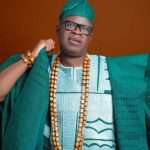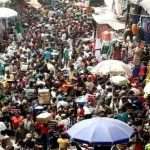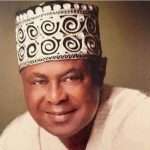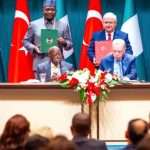
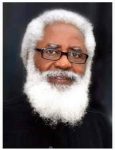
Dr Yemi Farounbi is an elder state man, a politician of repute and former Nigeria Ambassador to the Philippines. He is always an interviewer’s delight.

In this interview, the seasoned media administrator and politician, speaks on sundry national issues and the hope of Nigeria in this dispensation.
Excerpts:
In the course of our several interactions, you do always express the hope about the Nigerian State experiencing a great turn around. How far with the hope?
I still have hope in Project Nigeria. I still believe in the inevitability of Nigeria becoming a successful nation. Of course, a lot of things will happen; and they are beginning to happen.
For Nigeria to be the Nigeria of our collective dream, Nigerians will take over their own country and impose their own dreams on the leadership. Nigeria has been governed according to the whims and caprices of leaders. Ideally, we ought to have been governed on the basis of the visions of the leaders. The leaders ought to have marketed those visions to us. That would have been the ingredients of forming our collective dreams.
You are still sounding highly optimistic. But, with what we have happening around us, do you think we can have the dream realizable in one indivisible entity called Nigeria?
Yes, it is achievable so long as we all appreciate that one indivisible nation does not mean a unitary nation. Switzerland has one of the highest GDP; when it comes to peace rating, it is, perhaps, the highest. Small as it is, Switzerland is not run as a unitary nation. It recognizes that there are linguistic differences- there are Germans, French, Swiss and other languages. They fashioned for themselves a system of government that does not allow any of these linguistic units to become so dominant that it would render useless or irrelevant even the smallest unit. They have created an unusual federal or, in fact, almost a confederal structure that have given them the peace that they have.
In Switzerland, they have an arrangement at the apex of the country where all the federating or confederating units are represented, perhaps, by one person. That one person from a unit will be president for a year or two; another person will take over until all of them get to the position. The person who is the President today may become the Speaker tomorrow. So, they have fashioned that system for themselves because they have subsumed their individual greed and ambition under the weight of a collective dream.
It is clear to me that, even if the British had not come, it is just possible that we might have something resemblance of Nigeria. This is because there had been interactions within these various linguistic groups before the British came. It is only that the British forced us to come together. We probably would have come together voluntarily through interactions.
Now that we have been together, the British realized, by 1947, that they have not found a perfect way of governing Nigeria; that all constitutions they have done from 1904, 1914, 1922 and so on and up to the Richardson Constitution had failed. So, they felt that it was important to ask the people. And they did what we ourselves have refused to do: They went to district councils, divisional councils, provincial councils and regional level to collect opinions. Eventually, we ended up at the Ibadan National Conference.
The opinions the British collected showed that, yes, we can stay together if we are federal; if everybody can do what he wants in his house, but the few things that joined us together can be done commonly. And they agreed among themselves that those things that we needed to do together included protecting our boundaries that the British gave us. So, we needed a military- an Army or Air Force or Navy- that will join us together to protect the territorial integrity.
They realized that, yes, we would negotiate and discuss with the other countries. Therefore, we needed Foreign Affairs in common. But even then, they still allowed the sub-units to have foreign relations with other countries to protect their citizens. This was why the West, the East and the North had the then consul generals.
Then, they thought, yes, if we are going to be together, we need a common currency. Therefore, we need a Central Bank.
They also looked at internal security. They realized that there was a need for security across borders: you want to come from one federating unit to another, there must be somebody who takes care of such things. So, they looked at internal security at two levels, in fact, at three levels- there is internal security that was transnational, crossing the ethnic nations; there was internal security within the nation; and there was internal security within the units that made up the nation.
But Nigeria is still not a nation and it appeared contradictory when you talked about the dream of a Nigerian Nation, knowing that we have so many nationalities within the country called Nigeria…
Yes, Nigeria is not a nation; it is a country and it is going to remain a country for a long time. But you cannot, in any form or shape, turn Nigeria into a nation. This is because a nation must have a common language, a common history, a common culture, a common tradition. We don’t have all that and we cannot create that. We cannot force a common history on ourselves now, it is too late. Even if we try a common language, it is not possible. We cannot have a common culture.
So, you look at Nigeria as a country from a context of multi-lingual countries. We called India a nation, but really, it is not one because they have various languages, cultures and religions. So also also is Brazil; so also is Australia; so also is Canada.
But we can still have a common dream in Nigeria. But that common dream must be such that respect the individual history, culture, tradition, preferences, aspirations and hopes of all us who made up Nigeria. It is when we give that respect that we can build, in quote, a ‘nation’.
Let us take the 2023 general election as a case study. We all know that the election was conducted along divisive ethnic lines. Given these deep ethnic differences, do you think we can still have this common dream in a Nigerian Nation?
We can! It is a function of the leadership. The followers interact until the leadership creates divides. Northerners still come to my village to buy kolanuts. And in my village or town (because it is more than 5,000), we have a settlement of Fulani who have been there for more than 100 years. We have had interactions with the Fulani without any problems.
But when leadership becomes greedy and they personalized leadership, and they see leadership as an entitlement, or they see leadership as a reward, they then exploit the differences to put themselves in positions. Nigeria was not always bitterly divided like this, neither on ethnic line, nor on religious line. But those who want power, not necessarily for all of us but for themselves, will exploit any of these differences to achieve their aim.
In the 1983 elections, Shagari [the late former President Shehu] got to Ilorin, Kwara State and said “don’t vote for Turenchi people”. That was exploiting the ignorance, the anti-educational posture that he thought the masses of the North have so that he can win their votes.
So, when you whip the anti-Igbo sentiment in a Yoruba area, it is to garner votes for yourself. When the Igbo whip up a domineering anti-Yoruba sentiment, it is also to achieve that. It is not as if all of them are thinking of a common dream for us. What would be our common dream?
But can we even have a common dream?
We can! What is the American Dream, for example? They have divergent languages, cultures, history and traditions. But they said they want to build a nation where all Americans are equal and each American can achieve his own personal dream. It is a simple statement. It is like when you ask a Christian, why are you a Christian? He will say so that he can go to Heaven. It is a simple thing.
Every Nigerian must be treated as equal so that there can be no people born to rule and there can be no people born to serve. And if we are all treated as equals, then it means I cannot get 100 marks at entrance to Unity School in one part of the country and not meet the cut-off point and then somebody elsewhere gets 15 marks and meets the cut-off point.
The ingredients of equity, the ingredients of justice, put together, are the ones that can make you have a great nation. It is those ingredients that we undermine, as leaders, because we want to appropriate power to ourselves, disguising that the power is been appropriated for the people.
When you say Hausa/Fulani, for example, you know that there is nothing like; there are Fulani, there are Hausa and some other tribes. But when you say that, you cunningly used the population of the Hausa to support the minority interest of the Fulani. When we had the Eastern Nigeria, we were using the aspirations and the population of so many ethnic units that are now found in parts of the South-South to support the aspiration of the Igbo. And we did that in the West too, using Mid-West, Edo, Ijaw, Itsekiri, Urhobo and seeing them because they were Western Nigeria as ingredients to support the hope and vision of the Yoruba. That is what has been happening.
But when you realize that whether you are from Angas, that is the tribe of former military Head of State, General Yakubu Gowon- I am not sure they are up to one million- or you are from Hausa or Igbo or Efik or Ijaw, you must be equal to one another and you must be able to exploit your own talents to the highest level without any structural inhibition.
You are talking about an ideal society…
That is the ideal society we must work for but we are not working for it and that is the problem we have. But we seem to underrate the masses. It used to be said that the Yoruba are cowards- they are always enjoying merry merry- until they did “Operation Wetie”. And they were indifferent to the Civil War until somebody wanted to invade their territory from Owerri. And that was the turning point of the Civil War. It was largely the Yoruba Division, the Third Marine Commando, that seize the initiative because they were going to protect their interest.
We used to think that the Igbo were republicans- every community to itself. As a matter of fact, it was part of their history- until 1966 when the programme united them and they spoke with one voice against intimidation and oppression.
The Middle-Belt had always been seen as a people that can be overrun- farmers they were- and so many tribes, the biggest would the Tiv and Idoma, while the other were a welter of very small tribes. The Jukun, the tribe or ethnic unit of General Theophilus Danjuma, may not be up to half a million people. But they dominated the Army and they were factored as Northerners being exploited by the majority. But suddenly, in ’64, ’65, they became militant because they were being oppressed and the Police could not cope. As at the time the coup started, the military were, in fact, the one controlling internal security in the Middle-Belt. That might be distance history but not too distance for us not to remember.
Then recently some young boys felt they were being harassed by the Police: they could not enjoy themselves in the clubs. And, without any notice, like drama, they started an #EndSARS protest. These were boys that General Muhammadu Buhari had referred to as lazy and indolent. But they told us that they were not indolent.
You are right but some people still see the #EndSARS protesters as being sponsored by some disgruntled elements…?
If anybody said that, then he hasn’t the correct reading of what is happening. And now we are talking about the #EndBadGovernance protest.
So, what I am trying to say is that every group of people have a limit of tolerance. When you cross that red line of tolerance, they rise up to defend themselves.
But the #EndSars and the #EndBadGovernance agitations, somewhere along the line, fizzled out. What can you say about that?
They did not fizzle out; they were infiltrated. In any African country, when you have a gathering like that, our understanding of security is that we must infiltrate them. When we infiltrate them, it is not to gather information about what are their genuine grievances. We infiltrate them to create violence so that security forces can have an excuse to attack them.
When #EndSARS started and they were dancing and they were worshipping in Christian and Muslim ways and they were having parties and funs, there was no excuse. But as soon as we, I mean government, infiltrates them, they begin act of vandalism to give an excuse for security forces to attack them.
Of course, when you attack defenceless people, it would appear that such an agitation has fizzled. But no, you only bottled the anger. And anybody who studied Geology the way I have done will know that when you bottled an anger, it leads to what we called a volcanic eruption. It is like the heat in the soil that has no opportunity of escaping bottles over years; it reaches a high pressure point that it bursts out. Then, that heat cones out as a molten rock which we called lava and destroys things. Whereas, if you have provided a leakage for it to continuously escape, we are not likely to have a volcanic eruption.
It is the same with human beings. When it gets to a level of tolerance and you cross that line and it bottles up, they express their frustration, their anger. If you want stability, give them the opportunity to do that. If you don’t, then we have to recall the words of the US President J. F. Kennedy: “when you make peaceful change impossible, you make violent change inevitable”.
Talking about volcanic eruption, can you situate what is happening in Kenya under President Ruto Williams with what is happening in Nigeria today?
Not exactly on all forces because what happened in Kenya had a forewarning a year ago. The Bill they were protesting against was presented a year ago and the people reacted. The Bill was withdrawn and there was no need for them to continue to protest. But in March this year, they also had a run when the drivers’ union was opposed to parking fees and so on. The drivers withdrew their services all over Kenya one day. So, they had had a pre-run.
Now President Williams, in his wisdom or, in my own view, lack of it, now re-presented that same Bill. Having had two test runs, Kenyans knew where to go- the Assembly. And, because he too thought, as president, what he has done before he could do it this time, he called them stupid people; he called them indolent people and so on. This added more fuel to the fire. So, that is my worry in Nigeria. Nigeria is not as Kenya 2024; perhaps, Nigeria is as Kenya 2023.
But the indices are there. Under the President Bola Tinubu administration, for example, we have been have series of what appears to be multiple taxation; annual renewal of Certificate of Ownership on your car which used to be just once in the past, among other policies which appeared to be anti-people. Don’t you think that something akin to the Kenyan experience can happen here?
Nigerians are watching and they have been having rehearsals. The easiest way is for government not to persist on the same path the way Kenya persisted. This is because the people had also rehearsed and, perhaps, would have perfected what they want to do.
If you recall in one of my earlier interviews with you, you will remember that I referred to what I called “force of inertia”. You cannot have a country of 237 million people and think that they are all dumb. It is not possible. In Science, we say the total is greater than the sum of the part.
Nigeria is greater than 237 million people. This is because within those 237 million people there are multiple interactions. Those interactions must be counted along with the population. A will interact with B; B will interact with C. All those interactions will either change or alter the personality of individuals. So, you can no longer predict, very accurately, those individuals on the basis of their characteristics. You must reckon that they have interacted with other people. They have imbibed some things from other people. They have passed on some things to other people.
Unfortunately for all us, this is now a global village, with the Social Media available to almost all the 65 per cent youths that we have. So, they are not only interacting with the 237 million Nigerians. They are interacting with the Indians, the Chinese, the Japanese, the Americans, the English and the French. There is a rapid alteration of values and attitudes.
To therefore assume that one method that have been practiced in the past will become useable all of the time is to live in a fool’s paradise. That is what I called the force of inertia: When you parked a trailer, fully loaded and you put it in gear and hand-break and you put some stuck there, if you go back after one hour, the trailer would have moved. If you talk to the trailer drivers in Yoruba they would say ‘o nmi’ (it breathes).
As a Geology student, I know that rocks move. If you go and take the Olosunta Rock in Ikere-Ekiti, for example, and you mark it round, and you go back in a year- it is such a living organisation that grows- it would have moved because of the sheer weight.
So, when you have a country like this, 237 million people; that is a lot of weight. 450 linguistic units; that complicates the weight. 350 ethnic units; that compounds the weight. Then, religion, tradition, etc. Then you now bring the external exposure, not only of television, newspaper, radio, but more importantly of Social Media, you have in your hand a force that inevitably must move.
This huge force is going to say “we are not going to stay like this forever”. We have seen some of the biggest countries- China has the largest population and we have seen that they have built more railway lines than America has done. And they built them at a rate much cheaper than our own. They have built bridges in absolutely impossible terrains that, 50 years ago, you will think is impossible.
So, Nigerians would begin to look at that possibility to say “we can do that”. They will begin to look at the Indians, with their inferior clothes that they wear, dominating the leadership of the ICT world. These youths know that, in actual fact, they are perhaps better than any other group in the world. They are not going to accept a third-rate or a fourth-rate position forever. So, all of these, put together, will generate the inertia that would force Nigeria to recognise that these facts we shall hold self-evident that all human beings are created equal and therefore must have equal opportunity to actualise their talents.
When the Tinubu administration was about seven or nine months old, Professor Wole Soyinka said then that it was too early to do an assessment of the government. But he is still silent, now about 15 months into the life of the administration. Could this be taken as a confirmation of the general view that the activists of years back are now part of the government?
Soyinka may not be particularly a good example of the silence. This is because he criticize the government in his reaction to the #EndBadGovernance protest. There were protesters before and nobody opened live ammunition at protesters. And that is why he is saying, if you are in government today because somebody didn’t open live ammunition at you, and you were able to protest yourself to government, why must you now allow live ammunition to be used?
That is not an assessment of the government but just a reaction to an incident…
You are right; that might not be a total assessment of the government. I like one columnist in the Vanguard. I think he is late now. He is called Pini Jason. He has one theory, based on his assessment of these activists when they were activists. He said the farther away they are from government, the nosier they are and when they get to government, they stopped being noisy.
But in my case, I just look at George Orwell‘s Animal Farm. When they were activists as they were in the Animal Farm, they opposed the rulership of the human beings. When they overthrew the human beings, they started behaving like the human beings. So, nothing has changed.
Can you liken what you said now to what the self-styled former military President Ibrahim Babangida once said that the progressives of today are the conservatives of tomorrow?
As a matter of fact, the concept of progressive was formulated by President Woodrow Wilson in 1918 in America. He used to be a university professor and president. What he said about progressive then is now ultra conservative.
You see, progressive must been seen within the context of being progressive. There is no absolutely progressive ideals that would remain forever. It may be progressive at a time. At another level, it may not be. So the concept of progressivism is not static. But Nigeria we think it is. I did an eight-part series in Saturday Tribune about eight years ago: “Who Are The Progressives”. I take Chief Obafemi Awolowo as an example as the only man I think I know who understands, indeed and in truth, the concept of progressive.
When Awolowo started the Action Group (AG) in 1951, he said there would be freedom from British Imperialism, freedom from diseases and freedom from ignorance. That was what he built the AG around. Eventually, they called it Afenifere.
When it became the Unity Party of Nigeria (UPN), Awolowo did not repeat that. He had advanced: “I want free education”. It was no longer freedom from ignorance. Freedom from ignorance, literacy would take care of it. But education is different. He was not looking for freedom from diseases; he was now thinking of free health. He was now thinking of integrated rural development; that every part of the country must have access to the same amenities that you have in the urban centres.
But don’t you think that there was something rooted in the latter policy that was similar to what he had with the AG?
The policy in the AG was negative; the other one was positive. I want free health; I want full gainful employment and I have this rural development. If Awolowo were to be alive today, he would be talking of something else. He would have expanded because he realized that progressiveness has to keep on changing with the circumstances and with the technological, educational and economic development. I am sure that, by now, he would have included nuclear development and all of that into it.
So when people say they are progressives and they are still talking about free education, provision of potable water, provision of electricity, they have not gotten it. Those things have become conservatives.
President Bola Tinubu
What is your own assessment of the Tinubu administration? Is it too early to assess this man, some 15 months after he became the president?
Those who brought the concept of democracy talked about the first 100 days in office. If they think 15 months is too early, they will not be doing an assessment after 100 days. I am a student of Management Science. One of my areas of interest used to be Management by Objectives; it used to be Performance Budgeting System. In Management by Objectives, there are four things we look for: You must define the goals you want to achieve in terms of quantity. If it is road, you must tell us how many roads; you must tell us the cost at which you will do the roads; and you must tell is the time.
Time is a significant element in governance. That is why, when we started in 1960, we had what we called a four-year National Development Plan. After four years, we did an evaluation: how far have we gone?; how far have we failed? If we had failed, why did we fail? Then, we had the second National Development Plan and thereafter, we said we don’t want development plans again.
So, I have to assess Tinubu on the basis of what he promised. The easiest to do it is to look at his May 29, 2023 speech. Apart from removing fuel subsidy which was not in the speech but which he inserted; apart from the merger of the currency-the black market and the official rate- and the floating of the Naira, there were things that he promised. He said “this government will be committed to the welfare of the people”. I can now ask, after 15 months, has there been an indication that there is a commitment of this government to the welfare of the people? Indeed, and in truth, I will say there is no indication.
I will go on. Tinubu identified five or six areas and one of them was agriculture. He promised that we would have commodity boards. 15 months thereafter, we have not had any. He promised that agriculture would be arranged in such a way, to quote him, that “food would be affordable and accessible”. I will say I have not seen the indication.
I will go to electricity. Tinubu said, using the same words, that “electricity would be affordable and accessible”. As at yesterday (12 August, 2024), we were doing 3,500megawats. In a country of 237 million people, we have slipped from 5,000megawats to 3,500megawats. And we have split into Band A, Band B, Band C and Band Whatever to now say that Nigerians are not equal. And the essence of democracy is that we are all equal. So, electricity has not been accessible and affordable.
He said he was going to reform the budgeting process in such a way that there is not going to be inflation. But inflation has risen from 22 per cent in the last one year to 34 per cent. On food, it has risen to about 42 per cent, 44 per cent. On condiments of tomato, tatase and things like that, it has risen to about 300 per cent. Those figures given by the National Bureau of Statistics (NBS) are in contradiction of the promises of 15 months ago.
Of course, we have heard very loud talks of the coastal lines and roads: Lagos-Calabar Costal Line; Sokoto-Lagos Road, even though the Lagos-Ibadan Expressway has not been completed. I still drove through General Gas to Ojoo here in Ibadan. It has not been completed, after a promise of almost 12 years. I still look at the Oyo-Ibadan Expressway with dangerous potholes or boreholes that are created there.
I heard pronouncements by Dave Umahi [Minister of Works] that we are moving from bitumen to concrete roads. And Nigeria is the Number Two in the world after Canada. Why would we be using concrete when would have gone to invest in the development of bitumen which we can use to do all these roads? Perhaps, misplaced vision or misplaced priority or misplaced hope.
I think Tinubu has not delivered on his promises. There were promises issued by the media of the Presidency, conflicting as they are, about how many acreages of land that would be acquired. I think 150,000 hectares for corn and 120,000 for wheat. In one year and three months, that has not been done.
The president said he is busy with economic reforms. But I will love to draw his attention to what we used to call the Asian Tigers. Decades ago, they did so well; the rose from nothing to greater heights. You study any of them- Malaysia, Thailand, Singapore and Indonesia- the first thing they did was a political reform that activated economic reform. I wish our president will study that or his aides will go and look at it. They will find that changes in structure- in the arrangement of how people interact with one another; how they deal with or respect one another-affect economic performance.
So, one year, three months, we have had about four budgets operating simultaneously, Tinubu has not delivered on his promises. He may deliver tomorrow but, thus far, he has not.
In less than two months’ time, the icon known as Yemi Farounbi will be 80 years old. Are you a fulfilled man?
As a person, gifted by God’s grace with the spirit of contentment, I am fulfilled. But also as a person, gifted by God with the opportunity to have knowledge, education, exposure and therefore able to assess my environment and therefore I can say that my environment has not lived up to expectations, given its own potentialities. No, I am not happy.
I believe that Nigeria, with 20 per cent of the population of Africa, and 17 per cent of the population of the black people in the whole world and the resources that we have, including human particularly, not to talk of natural; I tell people that if you get to a foreign country and there is no Nigerian there, it does not worth your staying.
Nigerians have an immense capacity to innovate, to create, to succeed, to achieve in near-impossible situations. But here we are; we are in a garden, we are hungry. We have about one million square kilometres; about 60 per cent of our people, are on the farms yet, we are hungry. In the abundance of water, we are still thirsty. When I look at all that, I am an unhappy person.
What are your expectations?
Let me do what an average Nigerian will say: God will do it!!! But the God that I serve and that all Nigerians serve will only bless the work of your hand, not emptiness; not your hopes, but the real work of your hand. Are we working? When I say work, I don’t mean that everybody must go and plant tomato and onion in his house. It is not even the ideal.
Five per cent of the population of Americans are on the farm. Yet, they are all well fed. A little bit above 20 per cent of the population of South Africa are on the farm. We have 60 per cent. So, it is not a problem of number. It is the structure. The farms are too small for them to be mechanised. We have the land.
What to do is to change the approach to agriculture. We must reduce the population on the farms so that there would be fewer people with larger farms. They can put tractors to it. They can create dams to have irrigation. There is no reason why the south of Nigeria cannot produce maize three or four times in a year. Water is the only limitation. The sun is always there. So, you provide water for those seasons that there is no water.
Then, you provide fertilizer. But you cannot have one-solution fertilizer for Nigeria because the land changes and it varies. Nobody has done a reasoned analysis of our soil types. The soil in the South-West is certainly not the same soil in the South-East and certainly not the one in the North.
So, when the Federal Government imports fertilizer and distributes to everybody across board, it is an invitation to failure. This is why you have to re-arrange Nigeria such that those in the West, East or in the swampy Niger-Delta can deal with the peculiarities of their own areas with their own fund, with their own people and with the types of crops that can grow there and so on. So, I am not a happy person because I believe that all these are achievable.
In those days, we used to grow cocoa in the South-West because that was what our soil supports, particularly in the Ondo-Ekiti axis. When you get to Ikenne area, it changed to rubber. When you come to Iwo-Osogbo, it will change to palm trees. We have enough root crops like cocoyam, yam and so on to feed ourselves. But our economy was dependent on those tree crops.
So, when you started a FADAMA and everybody has to grow rice, what happen to cocoa and others as a source of income? When I used to visit Malaysia, I used to weep because as you are descending to the airport at Kuala Lumpur, and you see the miles and miles of palm trees- the seedlings of which were taken from here in the South-West- and you see the plantations, they have been so organised in such a way that the palm trees are in rows and they are not taller than four feets. In-between, there is a small path that you can drive your caterpillars or tractors. Nobody works; you don’t expect the farmers to work manually. The caterpillar is mechanically harvesting the fruits. They don’t have to be climbing. The caterpillars carry the fruits into the processing unit. You don’t have to been boiling them and walking with your bare foot on the hot palm nuts. This is why we are no longer producing palm oil
We are no longer number one in cocoa; we are no longer number in palm oil; we are no longer number one in rubber; we are no longer number one in groundnut. We have lost all of that. Our cotton is no longer there and that is why we have collapsed from over 2,000 textile mills to less than 10. Of course, our industries have folded up; they have migrated to other countries. It is not because we don’t have the raw materials. It is because we are no longer capable of growing them. The structure of the Nigerian society had killed agriculture.
How?
In those days, if you planted your cocoa in the West or your rubber in the Mid-West or groundnut in the North, where you had the Groundnut Pyramid, if you exported them, the exporters keep 50 per cent of the money. They only give the Federal Government 20 per cent. Today, if you do the same, you can only keep 13 per cent of the money. The Federal Government takes the rest. So, where is the motivation?
In America today, Texas is still the largest producer of crude oil. Texas takes care of its oil, pays a tax to the central government. California has the highest GDP in the whole world. It makes a lot of money from films and casinos. California keeps its money and pays tax to the central government. So, everybody is encouraged to work hard. The Scripture says we shall eat out of the sweat of our labour, but not in Nigeria. And of course, this kills the motivation and morale of those who used to sweat to produce.
With the ‘Light Up Oyo’ project, an initiative of Governor ‘Seyi Makinde, residents of most parts of Ibadan, the Oyo State capital, as well as some other parts of the state have, up till recently, been enjoying relative peace and security.
The Makinde administration commenced the ‘Light Up Oyo’ project in September, 2019 with the first phase covering Ibadan alone. By virtue of the project, night life came alive in many of the areas where the street lights are erected and are functional.
However, about three years down the lane, it appears that Oyo State, particularly Ibadan, is returning back to the days when darkness reigned supreme at nights.
Darkness has been an usual occurrence in some parts of the Ibadan metropolis, occasioned by the failure of most of the street lights to come up. However, it has become frightening that some critical parts of the metropolis are now in perpetual darkness.





